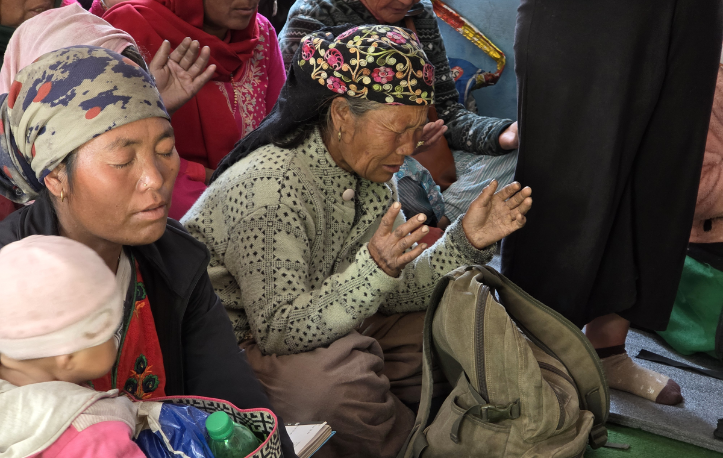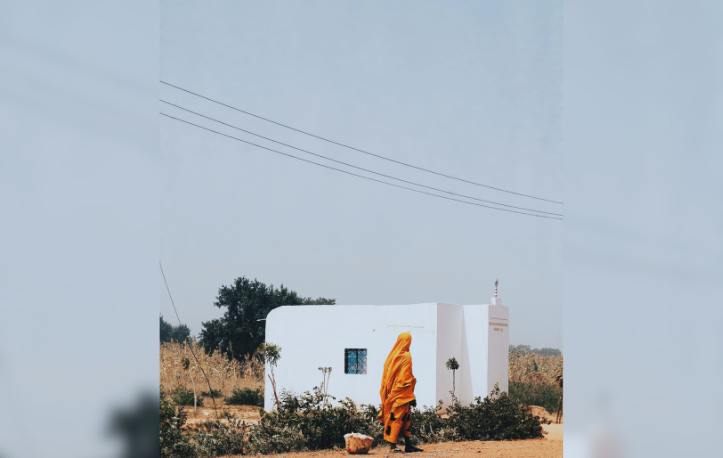In the early 1990s, when Hany was 12, a Dutch missionary named Anna arrived in his Lebanese village and started teaching children about Jesus in a local park. Although Hany was a member of the Druze community, the missionary’s teaching piqued his interest.
“I was raised in a Druze family,” he said, “but a non-religious one.” The Druze are a secretive ethno-religious group whose syncretistic beliefs borrow from the Abrahamic faiths, Greek philosophy and even Hinduism. The majority of the more than one million Druze are scattered across the eastern Mediterranean, with the largest communities in Syria, Lebanon and Israel.
Anna faced a significant challenge proclaiming the gospel in Lebanon, as the country was still recovering from a civil war between Christians and Muslims that lasted from 1975 to 1990. Roughly 120,000 people from multiple religious communities died in the war.
“This village … was an epicentre of fighting,” Hany said. “My mother’s father was the first one to be killed by the Christians. The very word Christian in this village made people nervous. For them, a cross, Christ, a Christian is the enemy.”
Though the Druze had considered Christians their enemies, Hany was intrigued by Anna’s gospel message. Soon, he began attending church in a neighbouring village, and some young men from the church started visiting his home to teach him more about Christ.
Some in the Druze community, however, did not approve of Anna’s teaching. Five women violently attacked her, causing injuries that forced her to leave Lebanon. The next time Hany’s friends from church came to his house, Hany’s father ordered them to leave and never return.
“How dare you do this!” Hany yelled angrily at his father after the young men left. As he grabbed a pillow to shield himself from his father’s slaps, he felt a Bible that one of the Christians had intentionally left under the pillow. Hany quickly put the pillow down so his father wouldn’t see the Bible. “I took the Bible and hid it,” Hany recalled. “It was the first Bible I ever had in my life.”
Though he was only 12, Hany started studying the Bible on his own. “I started every day reading one, two, three hours in the Bible,” Hany said. “For me, it was just like a challenge. I wanted to read … just to defy them.”
Hany read the entire Bible twice and read halfway through a third time. But without other Christians to encourage his studies, he gradually lost interest … until many years later during a time of need.
The Mouldy Bible
In the early 2010s, Hany began to experience some difficulties in his personal life. He and his wife lived in his parents’ home, and when Hany’s father died he feared that his marriage would collapse as a result of the poor relationship between his wife and mother. As Hany cried out to God for a solution, he felt led to pray to Jesus.
Hany prayed for an entire month, gradually remembering some of the verses the missionary had taught him. He also recalled the missionary telling him and the other children that God could speak through the Bible.
Hany searched his house for the Bible he had received as a child and eventually found it, though its condition had deteriorated with age. “I found the Bible in the attic,” he said, “and it was literally mouldy. It was all green mould on the edges, but you could read it.”
Holding the mouldy Bible, Hany asked the Lord to speak to him through whatever he read first. When he opened the Bible, he began to read the story of Hannah, in 1 Samuel. At first he didn’t understand how it applied to his situation, but as he continued to pray during the next three weeks he saw that he needed to follow Hannah’s example of fervent prayer.
“Lord, come and take care of my life, which I cannot really handle properly,” he prayed. That night, Hany slept peacefully and deeply for the first time in months.
The next day, when he answered a knock at the door, he was surprised to see one of the Christian men that his father had dismissed from the house years earlier. The man said he had sensed the Lord compelling him to return to Hany’s house that day.
Hany shared his problems with his old Christian friend, and through the man’s witness, Hany placed his faith in Christ. Several weeks later, his wife, who had listened to Hany’s conversation with the man, also placed her faith in Christ. Soon, even Hany’s mother came to know the Lord. “She forgave the Christians who killed her father,” Hany said.
As further evidence of God’s work in the family, the long-standing tensions between Hany’s mother and wife were suddenly resolved. “I still, to this day, don’t understand how it disappeared,” Hany said laughing.
Hany learned to proclaim the gospel as his faith matured, and eventually he started a house church. But being known as a Christian in a Druze community was not without its challenges. First, someone slashed his tires, and then one day his brakes suddenly failed. A mechanic said the brake line had been intentionally cut.
When Hany installed a hidden security camera outside his house, he discovered that a neighbour was sabotaging his car. Instead of directly accusing his neighbour, he decided to visit him and hint that he knew what the man had done. His non-confrontational approach worked; the surprised neighbour stopped harassing him and has spoken positively about him ever since. Hany’s refusal to seek vengeance soon had a positive effect on other Druze as well.
Reorienting Lives
An old family friend of Hany, a man named Samer, was part of a Druze community in Syria and was just as confused about the Druze religion as Hany had been as a youth. “We were living our lives blind and just trying to find our way through the darkness,” Samer said.
Samer wanted to know more about the Druze religion, but was told he would have to wait years to be allowed to study it. One thing he did understand, however, was the Druze tradition of blood feuds and vengeance. “For the Druze, honour and dignity are so important,” he said. “For someone to insult you, to threaten your dignity, to disdain you, … if you don’t go and [take] revenge and take your rights back, it means you are a coward and you are a very weak person.”
One morning in 2017, when a neighbour yelled up to his apartment that Samer’s car was on fire, he was overcome by thoughts of vengeance. As he ran to his car and tried to extinguish the fire, he could think only about who might have done it. But no one came to mind.
Firefighters soon arrived to help prevent the fire from completely engulfing Samer’s vehicle, but then his uncle encouraged the vengeful thoughts already in his mind: “What if someone is attacking you because you went to a church?” his uncle yelled.
Samer had attended a Christian worship service while working abroad, and it had made a lasting impression. “When I would go to a church, I would feel very happy when I listened to the songs,” he said. Those experiences of Christian worship made him want to know more about the Christian faith, so he began to attend church regularly when he returned to Syria.
Samer didn’t know if the car fire had been started by someone angry about his church attendance, envious of his successful barber shop or for some other reason. But he believed it was an attack, not an accident, and he was mad.
Hany, who was visiting Syria at the time, arrived at Samer’s apartment shortly after the fire was extinguished. “Samer was saying, ‘If I know who he is, I will smash him, kill him!’” Hany recalled.
Hany urged Samer not to retaliate. “No, no, no, we should not [take] revenge,” Hany told him. “We should be loving and forgiving.”
Hany’s suggestion shocked Samer. “This was the first time [for me] to see a Druze person who does not have the desire for revenge,” Samer said.
The suggestion to show love and forgiveness rather than vengeance opened the door for Hany to tell Samer about God’s grace. “I told him the story of the servant who was heavily indebted to his master,” Hany said. “His master forgave him of everything, but he was unwilling to forgive his friend.”
Hany used Christ’s parable to challenge Samer. “God forgave us for immense debts, and we cannot forgive others?” he asked pointedly.
The message touched Samer deeply as his heart was softened by the gospel. “We moved from talking about the burning car, and we kept talking about Christianity, about Christ,” Samer said. He placed his faith in Christ that day and later told his Druze family about the God of reconciliation.
But they rejected him. “When I tried to visit some of my relatives or acquaintances, they looked at me as … someone who denies his religion,” Samer said. “They said, ‘This is a traitor; here he comes’.”
In addition, his regular customers stopped visiting his barber shop, causing the collapse of his business. His family offered no assistance.
But others could see the dramatic change in Samer’s personality. “I used to be so intolerant,” Samer said. “I didn’t tolerate people even walking by without scowling at them.” Samer’s personality changed so much that his wife also placed her faith in Christ. Her parents, angered that she had abandoned her ethnic religion, tried to force her to divorce Samer. But she remained committed to Christ and her marriage.
Samer’s problems continued to mount, with his funds eventually decreasing to the point that he decided to leave Syria and move to Lebanon. He hoped he would face less persecution in the country where Hany lived. When he and his family reached Lebanon, he was so short of money and desperate to feed his family that he visited one of his brothers who lived there. He had hoped his brother would offer help, but his brother wouldn’t even allow Samer into his house. “Those in whom you believe, go to them,” his brother taunted. “I can’t help you.”
With help from the global body of Christ, Samer set up a new, temporary barber shop and found a place for his family to live in Lebanon. He and his family continue to struggle financially, however, because of ongoing economic instability in the country. They also continue to face rejection from members of the Druze community because of their Christian faith, something to which his friend Hany can easily relate.
“I love the Druze very much,” Hany said. “I have a real zeal to help them and defend them. But my heart is for Jesus.”




Submit a Prayer